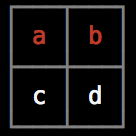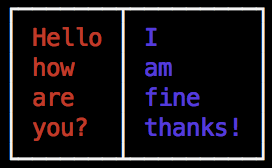basic-usage.md
5.95 KB
Basic Usage
// By default, headers will be red, and borders will be grey
var table = new Table({head:['a','b']});
table.push(['c','d']);
Basic Usage - disable colors - (used often in the examples and tests)
┌──────┬─────────────────────┬─────────────────────────┬─────────────────┐
│ Rel │ Change │ By │ When │
├──────┼─────────────────────┼─────────────────────────┼─────────────────┤
│ v0.1 │ Testing something … │ rauchg@gmail.com │ 7 minutes ago │
├──────┼─────────────────────┼─────────────────────────┼─────────────────┤
│ v0.1 │ Testing something … │ rauchg@gmail.com │ 8 minutes ago │
└──────┴─────────────────────┴─────────────────────────┴─────────────────┘
// For most of these examples, and most of the unit tests we disable colors.
// It makes unit tests easier to write/understand, and allows these pages to
// display the examples as text instead of screen shots.
var table = new Table({
head: ['Rel', 'Change', 'By', 'When']
, style: {
head: [] //disable colors in header cells
, border: [] //disable colors for the border
}
, colWidths: [6, 21, 25, 17] //set the widths of each column (optional)
});
table.push(
['v0.1', 'Testing something cool', 'rauchg@gmail.com', '7 minutes ago']
, ['v0.1', 'Testing something cool', 'rauchg@gmail.com', '8 minutes ago']
);
Create vertical tables by adding objects a that specify key-value pairs
┌────┬──────────────────────┐
│v0.1│Testing something cool│
├────┼──────────────────────┤
│v0.1│Testing something cool│
└────┴──────────────────────┘
var table = new Table({ style: {'padding-left':0, 'padding-right':0, head:[], border:[]} });
table.push(
{'v0.1': 'Testing something cool'}
, {'v0.1': 'Testing something cool'}
);
Cross tables are similar to vertical tables, but include an empty string for the first header
┌────────┬────────┬──────────────────────┐
│ │Header 1│Header 2 │
├────────┼────────┼──────────────────────┤
│Header 3│v0.1 │Testing something cool│
├────────┼────────┼──────────────────────┤
│Header 4│v0.1 │Testing something cool│
└────────┴────────┴──────────────────────┘
var table = new Table({ head: ["", "Header 1", "Header 2"], style: {'padding-left':0, 'padding-right':0, head:[], border:[]} }); // clear styles to prevent color output
table.push(
{"Header 3": ['v0.1', 'Testing something cool'] }
, {"Header 4": ['v0.1', 'Testing something cool'] }
);
Stylize the table with custom border characters
╔══════╤═════╤══════╗
║ foo │ bar │ baz ║
╟──────┼─────┼──────╢
║ frob │ bar │ quuz ║
╚══════╧═════╧══════╝
var table = new Table({
chars: {
'top': '═'
, 'top-mid': '╤'
, 'top-left': '╔'
, 'top-right': '╗'
, 'bottom': '═'
, 'bottom-mid': '╧'
, 'bottom-left': '╚'
, 'bottom-right': '╝'
, 'left': '║'
, 'left-mid': '╟'
, 'right': '║'
, 'right-mid': '╢'
},
style: {
head: []
, border: []
}
});
table.push(
['foo', 'bar', 'baz']
, ['frob', 'bar', 'quuz']
);
Use ansi colors (i.e. colors.js) to style text within the cells at will, even across multiple lines
var table = new Table({style:{border:[],header:[]}});
table.push([
colors.red('Hello\nhow\nare\nyou?'),
colors.blue('I\nam\nfine\nthanks!')
]);
Set wordWrap to true to make lines of text wrap instead of being truncated
┌───────┬─────────┐
│ Hello │ I am │
│ how │ fine │
│ are │ thanks! │
│ you? │ │
└───────┴─────────┘
var table = new Table({
style:{border:[],header:[]},
colWidths:[7,9],
wordWrap:true
});
table.push([
'Hello how are you?',
'I am fine thanks!'
]);


